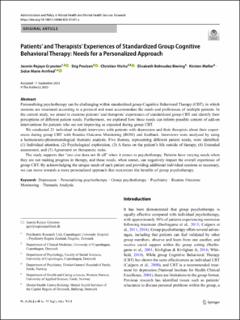| dc.contributor.author | Gryesten, Jasmin Rejaye | |
| dc.contributor.author | Poulsen, Stig | |
| dc.contributor.author | Moltu, Christian | |
| dc.contributor.author | Biering, Elisabeth Belmudez | |
| dc.contributor.author | Møller, Kirsten | |
| dc.contributor.author | Arnfred, Sidse Marie | |
| dc.date.accessioned | 2024-01-09T09:15:52Z | |
| dc.date.available | 2024-01-09T09:15:52Z | |
| dc.date.created | 2023-10-14T13:47:00Z | |
| dc.date.issued | 2023 | |
| dc.identifier.citation | Administration and Policy in Mental Health and Mental Health Services Research. 2023, . | en_US |
| dc.identifier.issn | 0894-587X | |
| dc.identifier.uri | https://hdl.handle.net/11250/3110514 | |
| dc.description.abstract | Personalizing psychotherapy can be challenging within standardized group Cognitive Behavioral Therapy (CBT), in which sessions are structured according to a protocol and must accommodate the needs and preferences of multiple patients. In the current study, we aimed to examine patients’ and therapists’ experiences of standardized group CBT and identify their perceptions of different patient needs. Furthermore, we explored how these needs can inform possible content of add-on interventions for patients who are not improving as expected during group CBT.
We conducted 21 individual in-depth interviews with patients with depression and their therapists about their experiences during group CBT with Routine Outcome Monitoring (ROM) and feedback. Interviews were analyzed by using a hermeneutic-phenomenological thematic analysis. Five themes, representing different patient needs, were identified: (1) Individual attention, (2) Psychological exploration, (3) A focus on the patient’s life outside of therapy, (4) Extended assessment, and (5) Agreement on therapeutic tasks.
The study supports that “one size does not fit all” when it comes to psychotherapy. Patients have varying needs when they are not making progress in therapy, and these needs, when unmet, can negatively impact the overall experience of group CBT. By acknowledging the unique needs of each patient and providing additional individual sessions as necessary, we can move towards a more personalized approach that maximizes the benefits of group psychotherapy. | en_US |
| dc.language.iso | eng | en_US |
| dc.publisher | Springer | en_US |
| dc.rights | Navngivelse 4.0 Internasjonal | * |
| dc.rights.uri | http://creativecommons.org/licenses/by/4.0/deed.no | * |
| dc.title | Patients’ and Therapists’ Experiences of Standardized Group Cognitive Behavioral Therapy: Needs for a Personalized Approach | en_US |
| dc.type | Peer reviewed | en_US |
| dc.type | Journal article | en_US |
| dc.description.version | publishedVersion | en_US |
| dc.rights.holder | © The Author(s) 2023 | en_US |
| dc.source.pagenumber | 0 | en_US |
| dc.source.journal | Administration and Policy in Mental Health and Mental Health Services Research | en_US |
| dc.identifier.doi | 10.1007/s10488-023-01301-x | |
| dc.identifier.cristin | 2184717 | |
| cristin.ispublished | true | |
| cristin.fulltext | original | |
| cristin.qualitycode | 1 | |

